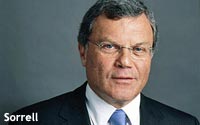Most WPP Shareholders Reject Executive Pay Plans
- by Steve McClellan @mp_mcclellan, June 13, 2012
 Nearly 60% of WPP shareholders voted against the company’s executive remuneration plan on Wednesday, which included a 60% compensation hike for
Sir Martin Sorrell to around $11 million for 2011.
Nearly 60% of WPP shareholders voted against the company’s executive remuneration plan on Wednesday, which included a 60% compensation hike for
Sir Martin Sorrell to around $11 million for 2011.
The vote was the strongest statement to date by shareholders of major ad holding companies that executive pay in the sector is too high. WPP shareholders were also the first at an ad holding company to reject an executive's pay plan by a majority vote.
Last week, about one-third of the votes cast by MDC Partners shareholders rejected that company’s compensation package for senior executives, including CEO Miles Nadal, who was paid about $23 million in 2011. Earlier, about 21% of votes cast by Omnicom’s shareholders rejected the company’s pay plan which included $15 million for CEO John Wren.
advertisement
advertisement
That said, while WPP shareholders rejected the pay package, they appeared to be happy with the way Sorrell has run the company. They re-elected him by a margin of over 98% to his seat on the board of directors.
Commenting on the vote, WPP chairman Philip Lader stated: "Our board exercised its best judgment in the context of the company's record year, international competitors, and the executives' performance. We take the Remuneration Report vote seriously, will consult with many share owners, and will then move forward in the best interests of our share owners and our business."
The WPP vote was not unexpected; executive pay has been a sore spot for investors for the last two proxy seasons.
Last year, a large minority -- 40% -- of WPP shareholders rejected the company’s pay plan. And this year, several institutional investors weighed in against 2012's package, including Institutional Shareholders Services, the influential shareholder advisory firm. A number of UK media pundits have commented on the subject in recent weeks, predicting that a majority of shareholders would reject the pay plan.
Shareholder votes on the pay packages are advisory in the UK and the U.S. but the Financial Times reported that the UK government is considering requiring that they be enforced by 2014.


